Top Travel Tips For Zanzibar( Best Travel Advice)
What Is The Official Lanuage In Zanzibar?-Top Travel Advice In Zanzibar
The local language spoken in Zanzibar is Kiswahili, also known as Swahili. Swahili serves as the lingua franca of the archipelago and is widely spoken and understood by the local population. Additionally, English and Arabic are also recognized as official languages in Zanzibar, reflecting the island’s diverse cultural heritage and historical influences.
How To Make Payments In Zanzibar?-
In Zanzibar, you can make payments using a variety of methods tailored to suit your needs and preferences as described below
- Cash: -Cash is widely accepted in Zanzibar, particularly in smaller establishments and local markets. The local currency is the Tanzanian Shilling (TZS). It’s advisable to carry small denominations for convenience, especially when purchasing items from street vendors or small shops.
- Credit and Debit Cards:- Many hotels, restaurants, and larger stores in Zanzibar accept major credit and debit cards such as Visa and Mastercard. However, it’s important to note that smaller businesses and rural areas may not have card payment facilities, so it’s wise to carry cash as a backup. ATMs:- ATMs are readily available in urban areas and tourist hubs throughout Zanzibar, allowing you to withdraw Tanzanian Shillings using your international debit or credit card. Be mindful of potential ATM fees and withdrawal limits imposed by your bank.
- Currency Exchange: Banks and authorized currency exchange bureaus in Zanzibar offer currency exchange services, allowing you to convert foreign currency into Tanzanian Shillings. It’s advisable to compare exchange rates and fees to ensure you get the best value for your money.
- Mobile Money: Mobile money services such as M-Pesa are widely used in Zanzibar, providing a convenient and secure way to send and receive money, pay bills, and make purchases using your mobile phone. You can top up your mobile money account at authorized agents or through bank transfers.
- Traveler’s Checks: While traveler’s checks were once a popular form of payment, they are less commonly accepted in Zanzibar nowadays. It’s best to rely on cash, cards, or mobile money for your transactions.
Local time
Local time is GMT + 3 during the winter season and GMT + 2 during the summer season.
When To Visit Zanzibar? (Top Travel Advice In Zanzibar)
Zanzibar is can be visited during most of the months within a year, although the recommended best time to go there runs from June to October. This is because it corresponds with the best time to visit Tanzania for wildlife safaris, making it a post- safari choice to unwind in one of the spectacular beaches in Zanzibar Island. However, the month of April is prohibited, because the Island beaches receive ponderous volumes of rainfall, which leads to high water levels in most beaches.
Medical services and vaccination In Zanzibar: Top Travel Advice In Zanzibar
Before embarking on your holiday to Zanzibar, it’s essential to seek advice from a healthcare professional at home to ensure you’re adequately prepared for your trip. Vaccinations for diseases such as typhoid, tetanus, diphtheria, polio, meningitis, and hepatitis A are commonly recommended for travelers to Zanzibar.
Additionally, the Tanzanian government mandates proof of yellow fever vaccination for travelers arriving from countries with a risk of yellow fever transmission, excluding the US.
While malaria is not prevalent in Zanzibar, there is still a risk, particularly during the rainy season. It’s advisable to protect yourself from mosquito bites by covering up after sunset and using mosquito repellent on exposed skin. As for drinking water, it’s best to boil and filter it or purchase sealed bottled water to avoid gastrointestinal issues. It’s important to note that medical facilities in Zanzibar are limited, so travelers should exercise caution and consider purchasing travel insurance that covers medical emergencies.
Travel Ban In Zanzibar:-Top Travel Advice In Zanzibar
As of June 1st, 2019, travelers planning to visit Tanzania should be aware of a significant regulation regarding plastic carrier bags. The Tanzanian government has implemented a ban on the use of plastic carrier bags, prohibiting travelers from bringing them on board or in their luggage. However, certain exceptions apply to plastic packaging used for medical services, industrial products, the construction industry, foodstuff, and sanitary purposes. Additionally, ziplock bags specifically designated for carrying toiletries are permitted. It’s crucial for travelers to adhere to this regulation and pack accordingly to avoid penalties upon arrival.
Transportation In Zanzibar:-Top Travel Advice In Zanzibar
Zanzibar boasts a well-connected road network, offering travelers various transportation options. For safety and convenience, it’s advisable to arrange transfers through your hotel or tour operator. Local taxis are readily available at the airport for immediate transport.
Renting a car is relatively affordable, averaging around USD 50 per day. However, drivers must possess an international driving license and pay a daily police permit fee of USD 3.
Driving in Zanzibar follows the left-hand side of the road, and while there are police checkpoints, they are typically routine checks. For budget-conscious travelers, the daladala truck provides the cheapest mode of local transport, albeit with discomfort and some risk.
Popular routes include Stone Town to Nungwi (No. 116), with other routes like Pongwe (No. 209), Matemwe (No. 118), Kiwengwa (No. 117), Jambiani (No. 309), and Kizimkazi (No. 326) also available.
Alternatively, hiring a bike offers flexibility, but caution is advised due to road safety concerns. With these transportation options, exploring the diverse landscapes and attractions of Zanzibar becomes accessible and convenient for travelers.
